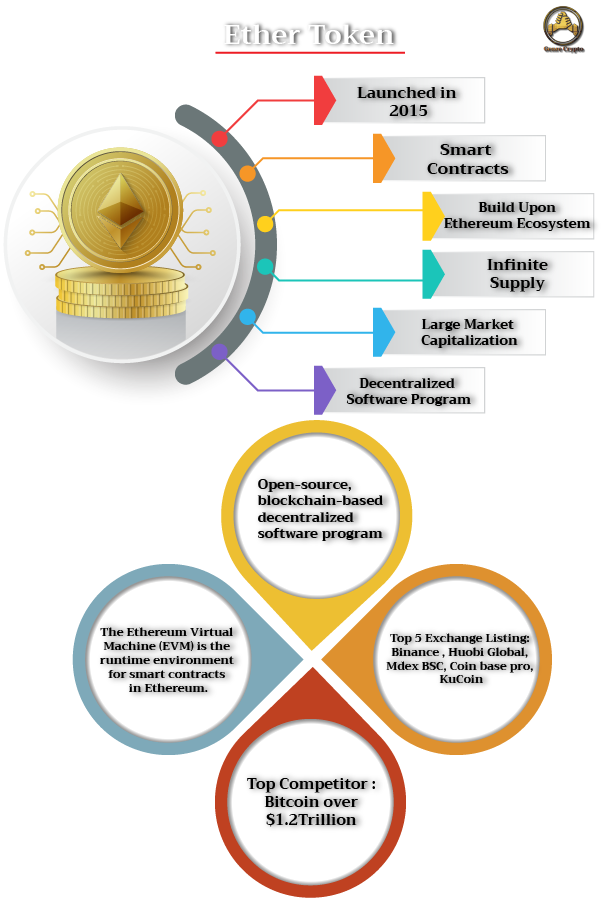
Ether Token
What Is Ether
Code : ETH
Type : ERC-20 Token
Category : Smart Contract Platform
About Ethereum
Launched in 2015, Ethereum is an open-source, blockchain-based, decentralized software program platform used for its very own cryptocurrency, ether. It permits smart contracts and Distributed Applications (Dapps) to be constructed and run with no downtime, fraud, control, or interference from a 3rd party.
Ethereum isn't always only a platform however additionally a programming language (Turing complete) walking on a blockchain, assisting builders to construct and put up dispensed applications.
Ethereum is frequently called the second most famous cryptocurrency, after Bitcoin. But unlike Bitcoin - and many other virtual currencies - Ethereum is intended to be more than just an exchange or value store. Instead, Ethereum calls itself a computer network used in blockchain technology. Let's find out what that means.
Company Founders & Team Behind

Founder
Vitalik Buterin
Key Features
Type Of Token
ETH Is An ERC-20 Token
Total Supply
No Limit On Total Supply.
Mined/ Minted
Ethereum Can Be Mined
Technology
How does Ethereum work?
In addition to being used as digital currency, Ethereum can be used to process other types of financial transactions, create smart contracts, and store third-party applications' data.
Like all cryptocurrencies, Ethereum operates on the basis of a blockchain network. A blockchain is a widely distributed ledger in a community where everything that is done is verified and recorded.
It is still distributed in the sense that everyone participating in the Ethereum network has the same copy of this ledger, which makes them see everything that has been done before. It’s decentralized in that the community isn’t operated or controlled through any centralized entity—instead, it’s controlled through all the disbursed ledger holders.
Blockchain transactions use cryptography to maintain community stability and confirm transactions. People use computer systems to “mine,” or clear up complicated mathematical equations that verify every transaction at the community and upload new blocks to the blockchain that is at the heart of the system. . Participants are rewarded with cryptocurrency tokens. For the Ethereum system, those tokens are known as Ether (ETH).
Ether may be used to shop for and promote items and services, like Bitcoin. There has also been a rapid rise in price in recent years, making it a de-facto investment. But the difference with Ethereum is that users can create applications that are "running" on the blockchain as software "running" on a computer. These applications can save and switch private information or take care of complicated monetary transactions.
Security Protocol
Ethereum smart contracts are extremely flexible, capable of both holding large quantities of tokens (often in excess of $1B) and running immutable logic based on previously deployed smart contract code.
While this has created a vibrant and creative ecosystem of trustless, interconnected smart contracts, it is also the perfect ecosystem to attract attackers looking to profit by exploiting vulnerabilities in smart contracts and unexpected behavior in Ethereum.
Smart contract code usually cannot be changed to patch security flaws, assets that have been stolen from smart contracts are irrecoverable, and stolen assets are extremely difficult to track.
Operating Speed
The Ethereum 1.0 network can only support approximately 30 transactions per second, compared with Ethereum 2.0 which is said to be able to handle 100,000 transactions per second.
Governance Protocol
Ethereum operates similarly to bitcoin through an off-chain governance model. It works in this manner:
- Developer submits changes as in upgrade code
- Reviewed by the core Ethereum developers
- Put to vote in the community.
- If passed the code is merged into the base code.
Ethereum Infographics

Real World Use
Decentralized finance (De-Fi)
One of the most promising real-world use cases for Ethereum are decentralized finance applications, also often abbreviated as “De-Fi”. This includes smart contract powered loans, minting of stable coins, and decentralized exchanges. One notable project in this category is “Maker DAO”, which through the use of elaborate Ethereum smart contracts has enabled the creation of a stable coin (DAI) that is backed by Ether and is always worth $1.
Health applications
Ethereum will completely revolutionize the health-care system. All hospitals around the world can store, access and share their patient’s records. This is a key factor in developing new vaccines for viral outbreaks, or even preventing them in the first hand. You can go to a doctor in Thailand for a checkup when you are on holidays and to a hospital in New York when you are back home again, and both will have the same information about you.
But that’s not all. Remember the whole wearables craze a couple of years ago? Well, like it or not, those devices are here to stay. Now imagine that the data your smartwatch records every day are automatically shared with every hospital in the world. This way, patterns could be found in medical conditions like heart attacks or strokes, and you could be warned even before it happens. Ethereum will make this possible, and possibly save YOUR life one day.
Security Infrastructure
The fact that there is no central server for a hacker to attack makes it a lot harder to break into, for example, a website and steal your personal information.
Payment Token Ether
The world’s economy is based on transactions… And Ethereum is going to change them forever. On Ethereum, so-called “smart contracts” can be made. These make it possible to exchange anything of value, completely risk-free. Instead of creating an old-school agreement on paper, the transaction is recorded in computer code.
So imagine that instead of buying a photo from a platform like Shutterstock, you buy it directly from the photographer and initiate a contract with him/ her to buy the photo. This is made possible by the “If This Then That” (IFTTT) logic built deeply into Ethereum’s system.
So for example: If the buyer puts the money in an escrow account, the photo will be downloaded.
Ether, native token of Ethereum is a store of value which guarantees the exact current market price at exchange irrespective of the time or place of transaction.
Smart Contracts
Smart Contracts works on IF-THIS-THEN-THAT (IFTTT) concept.
IF-THIS-THEN-THAT are conditional statements that creates a chain of events based on the outcome of a previous result. For eg. If I pay Bill $100 then Bill would pay me back 5 Ethereum or else Bill would keep his 5 Ethereum.
With Smart Contract Ethereum has created an ecosystem of trustless, interconnected network thus replacing old school paper agreements.
Voting Systems
As we’ve seen with DAO, voting systems are adopting Ethereum. The results of polls are publicly available, ensuring a transparent and fair democratic process by eliminating voting malpractices.
Top Case Studies You May Like
PLEASE NOTE: The above information is issued in public interest to create more awareness around various cryptocurrencies. However Aclaran Protocol, or any of its associate companies takes no responsibility of the above information. Please Do Your Own Research Before Investing.






